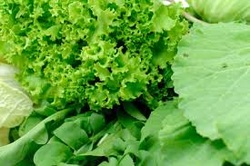
So, what are those differences? To answer this question, I made up a list of leafy green vegetables and went to the USDA National Nutrient Database. I learned some very interesting things. For example, the most extreme difference in a nutrient is vitamin A. Turnip greens, which have the most vitamin A, have about 118 times more vitamin A than cabbage, which has the least amount of vitamin A. In fact, even iceberg lettuce, considered to be the least nutritious lettuce, has about five times more vitamin A than cabbage. That was surprising!
I gathered the nutritional facts for 100 grams of each of the following leafy green vegetables: kale, spinach, collard greens, Swiss chard, romaine lettuce, green leaf lettuce, red leaf lettuce, Boston (butterhead) lettuce), iceberg lettuce, arugula, mustard greens, turnip greens, dandelion greens, cabbage, bok choy, watercress, and broccoli rabe (rapini). Then I compared nutritional facts for each leafy green vegetable to determine the best sources for each nutrient. Below is a summary of the top three leafy green vegetables for each nutrient listed from most- to least-abundant per 100 grams:
- Protein: kale (4.28 g); broccoli rabe (3.17 g); collard greens (3.02 g)
- Fiber: collard greens (4.0 g); dandelion greens (3.5 g); mustard and turnip greens (3.2 g each)
- Calcium: collard greens (232 mg); turnip greens (190 mg); dandelion greens (187 mg)
- Iron: dandelion greens (3.10 mg); spinach (2.71 mg); broccoli rabe (2.14 mg)
- Magnesium: Swiss chard (81 mg); spinach (79 mg); kale and arugula (47 mg each)
- Potassium: spinach (558 mg); kale (491 mg); dandelion greens (397 mg)
- Vitamin C: kale (120 mg); mustard greens (70 mg); turnip greens (60 mg)
- Folate: spinach and turnip greens (194 micrograms each); kale (141 micrograms); romaine lettuce (136 micrograms)
- Vitamin A: turnip greens (11,587 IU); dandelion greens (10,161 IU); kale (9,990 IU)
- Vitamin K: Swiss chard (830 micrograms); dandelion greens (778 micrograms); kale (705 micrograms)
My take-away is that in order to get the most nutrition, mix it up and get a variety of leafy greens.
Something important to point out is that vitamin K helps blood coagulate and reverses the anticoagulant activity of blood thinner medications such as warfarin (Coumadin). So if you are taking any type of anticoagulant or blood thinning medication, notify your doctor so that it can be factored into your dosage.
To get a copy of the full report of all the nutrients in this list of leafy green vegetables, go to the Ask Dr. Q tab under “more…” and submit your name and email address. Be sure to type “leafy greens” in the question box.
Resources



 RSS Feed
RSS Feed